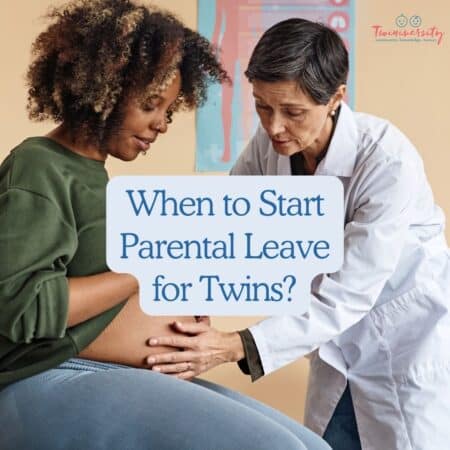Last updated on September 30th, 2021 at 10:11 am
There are few things that have made me feel as powerless as the feeling of not being able to support my new family. As parents of twins we are familiar with certain types of isolation that come from handling two children of the same age, at the same time, such as isolation at play dates (perhaps while other caregivers chat happily keeping an eye on their one child, while you run around making sure your two don’t tear the place apart.) There is also a sense of financial isolation that many of us are familiar with; the factor of having two kids at the same time often prohibits extra curricular activities and the cost of childcare for two kids makes it difficult for a partner to return to work.
As a twin mom, the first 18 months of my twins’ lives forced me to learn the lesson of how to simplify what I consumed and how to change my values for what constitutes “necessary” in order to claim power over my finances. I am writing about this because I experienced shame when my family struggled financially. I felt that since I was struggling financially then I must have a character flaw or moral shortcoming. Nobody told me that, directly, it was my experience of my situation. What I learned through that struggle is that the believing you are “bad with money” — or that you have something intrinsically wrong with you financially — is ridiculous. Discomfort and fear are important teachers to have, as long as they lead to the excitement of finding 4 pairs of baby pajamas for $3.19, rather than a fixed sense being stuck and hopeless.
Before I had kids I would characterize my risk assessment as poor. When I was in my 20s I had little perspective on what it meant to provide for someone else. I basically spent money how I wanted, because I was single and had a job. I paid my bills, saved for retirement, and was trying to ignore my looming student debt, a giant risk that I was attempting to wish out of existence. There was ease to this, or so I thought. What did I do with this ease? I quit a well-paying job with student loan debt to take on more student loan debt to get a second masters degree. Then I got pregnant with twins. My husband, who was my boyfriend at the time, was self-employed in his own business he had started a year earlier. The business was new and supporting him, but he was not ready to support three other people. I wanted to get a job as soon as I found out I was pregnant, but as the pregnancy progressed I spent more and more time at the doctor’s office, making myself a less than ideal new employee. Here we were with no reliable income and two babies on the way. It was scary. I felt shame and fear at the prospect of having and raising two kids with no reliable income. This day–to-day fear and guilt would stretch on for the first year and a half of my kids’ life, as well as our new marriage, until we got a footing for our family.
In the first year and a half the cost of diapers and formula for two babies added up. Each time we came to the bottom of a can I grimaced. I partially breastfed them, but was not able to exclusively breast feed them due to hypoplasia and the pressure of this seemed to crush me each time we had to confront buying a new can of formula. At times, we relied on the support of our families for basics like groceries. It is not lost on me how fortunate we were to have family that could help us in this way. It was our families that kept us afloat in this time, and although we knew we were fundamentally safe, each month we feared not being able to pay our mortgage. I came face-to-face with a narrative I had always feared about myself: I was doomed to be horrible at managing money and this would negatively impact my children. I didn’t realize that I was slowly being taught how to live in a way that would greatly benefit my children. At the time, I felt like a failure of an adult. I certainly felt like an adult who did not make good choices, and that was disheartening on top of the pressure of raising two newborns. It was at this time I learned that you actually need very little at all to thrive. Roof over our head? Check. Food in the fridge? Check. We are safe and together? Check. Then it’s going to be ok.
When a new job provided increased financial stability for us, we became determined to never go back to the place of risk and uncertainty, where we didn’t know what, if anything, we could provide for our children. There is a constant dedication to simplifying in order to maintain financial security. I remember a moment when we first became financially stable — meaning we could meet all of our monthly expenses and have some money to pay our student loan debts — I walked around Target and marveled at the pillows and vases. They were so beautiful. I picked up a vase, put it in the cart and I paced. I paced the store, circulating around the parameter, oscillating between feeling deserving of that vase because now we could “afford it” and then I thought about that vase in my house. I was recently at a thrift store where there was a vase from a similar store with the tag still on it. It made me sad. Someone bought it because they thought they wanted it enough to buy it, but then didn’t even care enough about it to take the tags off, and then gave it away. Who knows how it actually got there, and goodness knows I’ve given away things with tags on them. But I looked at the vase in my cart and I thought about all the thrift shop vases, and my kids knocking over that one in the cart, or having to pack it for a move, or having to store it — when I changed my mind about liking it and I just put it back. This was a victory.
Simplifying and paring down what we allow into our lives became a part of our stability. It was small step in the direction of moving from someone who identifies as not being able to handle money to someone who has control of the future of her finances to best support her children. Now I always use lists and budgets when purchasing things, but I still do that same trip around the store before I am about to buy something and ask myself, “How can I spend less on this thing, or pare down what is in my cart, even if I think I need it, even if I put it on a list and it fits into my budget?”
What we’ve learned about simplifying and creating stability for our kids
1.We make a budget together every single month. I was talking to two of my friends about this recently and they sarcastically commented, “Oh, that sounds like a lot of fun.” I am surprised to say it as someone who always struggled with budgets, but it is fun because it is a source of us carving out our hopes for our kids and the future. It gives us a sense of control, which previously alluded us. We use a free online tool called everydollar.com, but there are several tools available for free online. They are easy to use and have helped us tremendously.
2.Continuously identifying as someone who can manage money properly. I changed from a person who felt that I had no ability to actually change, stuck in my inability to manage money, to someone who supports two kids, with one income, in one of the most expensive areas of the country. I bottomed out in my financial self-esteem and this made me realize how much shame I felt around money. Once I could face that shame and say I didn’t want the same for my kids, it helped me shed that ridiculous, unhelpful low-self esteem.
3.Say no to stuff. The only purchased things that come through our door is groceries. With two kids it’s easy to fall into the trap of thinking I need to buy things to do with them. It’s a constant dedication to simplification; figuring out how not to bring unnecessary things into our home. There are many ways, with the library being the primary source of entertainment.
The stressor of not knowing how much money we would have and when we would have it was not easy on our relationship, especially as a newly married couple who had been married only a month before the birth of our kids. Most couples would have been returning from their honeymoon as we were walking into our apartment with two babies. We both constantly faced a bottomless pit of fear, guilt and powerlessness. We were mean to each other at times, we were angry at each other a lot. We don’t intend to go back to that place. I am sharing my story because I think it’s common for people to fear money and feel shame around financial struggles, especially with the being faced with buying two of many things at the same time. We used our instability to learn about each other and grow, and we take our experience as inspiration to keep our family on the path to financial security.
Article by Anon-A-Mom
Related Articles
10 Money Saving Hacks For Parents











